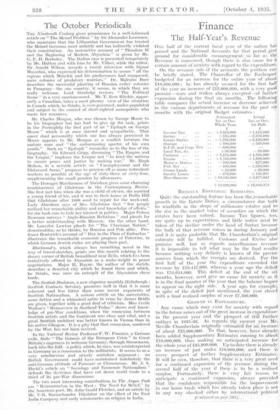The October Periodicals
TUE Nineleenth Century gives prominence to a well-informed article on "The Memel Problem ".by Sir Alexander Lawrence, who maintains that ,the Lithuanian Government has treated the Memel Germans most unfairly and has indirectly violated their constitution. An instructive account of " Theodore II' and the Beginning of Modern Abyssinia " is given by Mr. G. F. H. Berkeley. The Italian case is presented temperately by Mr. Hutton and with bias. by Mr. Villari, while the editor, Sir Arnold Wilson, records a recent interview with Signor Mussolini, who expressed his determination to secure " all the regions which Menelek and his predecessors had conquered, mere colonies of predatory warriors." Dr. Malcolm Burr describes the successful planting of Russian exiles' colonies in Paraguay—the one country, it seems, in which they are really welcome. Lord Strabolgi reviews. " The Political Scene " in a very cautious Mood. Mr. T. Kerr Ritchie, appar- ently a Canadian, takes a most gloomy view of the situation in Canada which, he thinks, is over-governed, under-populated and subject to the control of short-sighted monopolists who waste her resources.
Mr. Charles Morgan, who was chosen by George Moore to be his biographer but has had to give up the task, prints in the Fortnightly the first part of an " Epitaph on George Moore " which is at once shrewd and sympathetic. That queer dual personality which one has always perceived in Moore appears to Mr. Morgan as a conflict between the mature man and " the embarrassing spectre of his own youth:" Such an " Epitaph " reconciles us to the loss of the biography. Sir Edward Grigg, discussing " The Empire and the League," implores the League not " to bind the nations to ensure peace and justice by making war." Mr. Hugh Molson, in a notable article on "Unemployment and the Distressed Areas," proposes to pension off as many redundant workers as possible at the age of sixty-three or sixty-four, supplementing the small pension by allowances.
The Dowager Marchioness of Aberdeen gives some charming reminiscences of Gladstone in the Contemporary Review. She first met him when she was a child of eleven, she married a young friend of his, and it was to their house at Dollis Hill that Gladstone after 1880 used to repair for the week-end.
Lady Aberdeen says of Mrs. Gladstone that " few people realised her remarkable ability and real knowledge of affairs," for she took care to hide her interest in politics. Major Poison Newman surveys " Anglo-Russian Relations " and pleads for a better understanding with Moscow. On the other hand, Mr. Lancelot .Lawton pleads for " The Ukrainian Nation," downtrodden; so he thinks, by Russian and Pole alike. Pro- fessor Bentwich's account of " Day in the Plain of Esdraelon " illustrates the remarkable economic progress of Palestine, in which German Jewish exiles are playing their part.
Blackwood's, which always has something novel in the way of travel-sketches, prints one this month relating to the dreary corner of British Somaliland near Zeila, which has been tentatively offered to Abyssinia as a make-weight in peace negotiations. Major H. Rayne, the author of the sketch, describes a deserted city which he found there and which, he thinks, was once an entrepOt of the Abyssinian slave trade.
The Scottish Bookman, a new sixpenny monthly (Edinburgh : Scottish Contacts Service), promises well in that it is more coherent and less bitter than some recent exponents of Scottish Nationalism. A serious article on the universities, some fiction and a whimsical satire in verse by James Bridle are given, together with a good deal of criticism. Miss Cecile Walton's " Renascence in Scotland Today" shows real know- ledge of pre-War conditions, when the connexion between Scottish artists and the Continent was close and vital, and a great Scottish architect was better known in Vienna than in his native Glasgow.' It is a pity that that connexion, sundered by the War; has not been revived. In the National Review Professor-F. W.. Foerster, a Gerinan exile, finds • " The Genesis of the European Crisis " in Great Britain's eagerness to welcome Germany; through Stresemann, back into the.fala poliCY which, he says., was misinterpreted in Gerniany:as a Concession to the militarists. It seems to us a very mischievous and utterly mistaken argument ; no British Government could have maintained indefinitely the anti-German attitude of Poincare or Clemenceau. Mr. J. S. Hecht's article on " Sociology and Economic Nationalism " defends the doctrines that have cut down world trade to a third of Ate pre-War dimensions.
The two, most interesting contributions, to The Aryan Path are "Reincarnat:on in 'the West : The Need for Belief," by the American poet, Mr. John Gould Fletcher, and an article by Mr. V.R. Ramachandra .Dikshitar on' the effect' of the East India Company and early missionaries on religion in India. . _ . .........










































 Previous page
Previous page